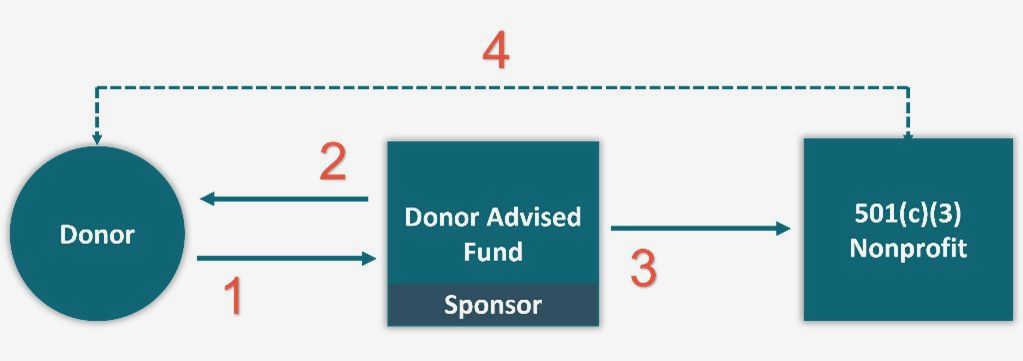Donor-Advised Funds (DAFs) have emerged as a powerful tool for driving positive change in civil society. These funds allow individuals and organizations to set aside money for charitable giving, while also providing flexibility and control over how those funds are distributed. DAFs offer a way for donors to make a lasting impact on communities and causes they care about, and they have become increasingly popular in recent years.
One of the key benefits of DAFs is their ability to simplify the process of charitable giving. Donors can contribute to a DAF and receive an immediate tax deduction, while also having the freedom to decide when and how to distribute the funds. This flexibility allows donors to strategically support causes and projects that align with their values and goals, while also taking advantage of tax benefits.
Furthermore, DAFs provide a space for individuals and organizations to come together and collaborate on collective giving. Donors can pool their resources in a DAF and work together to address complex social issues. This collective approach can have a greater impact than individual giving, as it allows for larger-scale projects and initiatives. DAFs also provide a platform for donors to learn from each other, share best practices, and leverage their expertise to drive positive change.
In addition to their practical benefits, DAFs also play a crucial role in fostering a culture of philanthropy. By making charitable giving more accessible and engaging, DAFs encourage individuals from all walks of life to become actively involved in supporting causes they believe in. This not only strengthens civil society, but also helps to build a more compassionate and equitable society overall. DAFs have the potential to drive positive change in communities around the world, and their importance in civil society cannot be overstated.
Donor-Advised Funds: Revolutionizing Charitable Giving
Donor-advised funds (DAFs) have emerged as a revolutionary approach to charitable giving, enabling individuals and families to have more control and flexibility over their philanthropic activities. With a DAF, donors can create an account with a sponsoring organization and contribute funds to it, taking an immediate tax deduction. They can then recommend grants from the fund to qualified nonprofit organizations of their choice.
This model of giving has transformed the way individuals and families engage in philanthropy. DAFs provide donors with the ability to take a more strategic and long-term approach to their charitable giving. By pooling charitable dollars into a fund, donors can make larger, more impactful grants to support causes they are passionate about.
One of the key advantages of DAFs is the ability to separate the timing of the tax deduction from the actual distribution of funds. This allows donors to take immediate deductions when they are in a higher tax bracket, while still having the flexibility to distribute funds to charitable organizations over time, as their philanthropic goals evolve.
Furthermore, DAFs offer donors a high level of privacy. Unlike traditional direct giving, where donors’ names and contribution amounts are often disclosed, DAFs provide donors with the option to remain anonymous. This can be especially beneficial for donors who wish to avoid solicitations or public attention.
In conclusion, donor-advised funds are revolutionizing the landscape of charitable giving by empowering individuals and families to have greater control and flexibility with their philanthropic endeavors. This model allows donors to take a strategic, long-term approach to their giving, while also providing them with tax advantages and privacy. With the rise of DAFs, more individuals are able to drive positive change in civil society and make a lasting impact on the causes they care about.
Maximizing Impact Through Donor-Advised Funds
Donor-advised funds are a powerful tool for individuals and organizations looking to make a positive impact on civil society. Through these funds, donors have the flexibility to create a sustainable giving strategy that aligns with their values and goals.
One of the key benefits of donor-advised funds is the ability to maximize the impact of charitable giving. By consolidating all charitable donations into a single fund, donors can take advantage of economies of scale and ensure that their contributions are used efficiently and effectively. This approach allows donors to have a greater impact on the causes they care about, as the funds can be directed towards high-impact projects and initiatives.
Another advantage of donor-advised funds is the ability to take a long-term approach to giving. Donors can choose to invest their funds, generating returns that can be used to support charitable projects in the future. This allows for a more sustainable and strategic approach to philanthropy, ensuring that funds are available for ongoing support and addressing emerging needs in civil society.
Donor-advised funds also provide donors with the opportunity to engage in collaborative giving. By pooling resources with other donors, individuals and organizations can amplify their impact and tackle complex societal challenges together. This collaborative approach allows for greater coordination and the ability to drive systemic change, moving beyond short-term solutions to address root causes and create lasting social impact.
In conclusion, donor-advised funds offer a powerful vehicle for individuals and organizations to maximize their impact on civil society. Through these funds, donors can consolidate their giving, take a long-term approach to philanthropy, and engage in collaborative giving to drive positive change. By leveraging the benefits of donor-advised funds, donors can make a meaningful difference and contribute to a more equitable and prosperous society.
The Power of Donor-Advised Funds in Philanthropy
Donor-advised funds (DAFs) have emerged as a powerful tool in philanthropy, allowing individuals, families, and businesses to have a direct impact on the causes they care about. These funds offer donors flexibility and control over their charitable giving, while also providing tax advantages and opportunities for strategic giving.
One of the key advantages of DAFs is their simplicity and efficiency. Donors can set up a fund with a minimum initial contribution and then make additional contributions at any time. This makes it easy for individuals and families to establish a giving strategy and support multiple charities without the need for complex paperwork or multiple transactions.
With a DAF, donors have the ability to recommend grants to a wide range of nonprofit organizations. They can choose to support organizations with a specific mission, such as education, healthcare, or the environment, or they can diversify their giving across multiple causes. This flexibility allows donors to respond to emerging needs and make a positive impact in areas that align with their values and priorities.
Another benefit of DAFs is the opportunity for long-term philanthropic engagement. Donors can grow the assets in their fund through investments, allowing their giving to have an even greater impact over time. This is particularly beneficial for donors who want to create a lasting legacy and continue supporting the causes they care about beyond their lifetime.
Furthermore, DAFs offer anonymity for donors who may prefer to give privately. While nonprofits typically publish lists of their donors, DAFs provide a level of confidentiality, allowing donors to support causes without public recognition. This can be particularly appealing to individuals and businesses who have specific reasons for wanting to keep their charitable giving private.

In conclusion, donor-advised funds have become a powerful tool in philanthropy, empowering individuals, families, and businesses to make a difference in their communities. With their simplicity, flexibility, and ability to create lasting impact, DAFs are driving positive change in civil society and encouraging greater charitable giving.
How Donor-Advised Funds are Driving Social Change
Donor-advised funds (DAFs) have emerged as a powerful tool for driving social change. These funds allow donors to contribute to a charitable organization and make recommendations on how the funds should be used. By pooling resources and leveraging philanthropic expertise, DAFs have the potential to drive meaningful impact in civil society.
1. Mobilizing resources: DAFs enable individuals and families to pool their charitable resources, resulting in larger sums of money available for social initiatives. This collective giving approach allows for more significant investments in causes such as education, healthcare, and environmental conservation.
2. Impactful grantmaking: DAF holders have the autonomy to allocate funds to organizations and projects that align with their philanthropic goals. This flexibility enables donors to support a wide range of initiatives and respond quickly to emerging needs. By funding innovative solutions and supporting grassroots organizations, DAFs can drive social change at both the local and global levels.
3. Long-term sustainability: DAFs provide a sustainable source of funding for charitable organizations. With the ability to allocate funds over time, donors can support long-term initiatives and ensure the continued impact of their contributions. This stability enables organizations to plan and implement projects with confidence, fostering lasting change in civil society.
4. Philanthropic collaboration: DAFs foster collaboration among donors, nonprofits, and other stakeholders. Through DAFs, donors can join forces to address complex social challenges and leverage their collective knowledge and resources. By sharing best practices, collaborating on initiatives, and pooling expertise, DAFs create a network of philanthropists driving social change together.
5. Transparency and accountability: DAFs promote transparency and accountability in the philanthropic sector. Donors have a vested interest in tracking their contributions and ensuring that the funds are used effectively. DAFs often require organizations to provide progress reports and evaluations, ensuring that the funds are making a real difference in society.
Conclusion: Donor-advised funds have emerged as a dynamic force for driving social change. Through mobilizing resources, impactful grantmaking, long-term sustainability, philanthropic collaboration, and promoting transparency, DAFs have the potential to create lasting, positive change in civil society.
Leveraging Donor-Advised Funds for Lasting Community Impact
Maximizing Philanthropic Effectiveness
Donor-advised funds have emerged as powerful tools for individuals and families looking to make a difference in their communities. These funds allow donors to contribute to a pool of charitable assets and then recommend grants to nonprofit organizations of their choice. By leveraging donor-advised funds, individuals can achieve maximum impact with their philanthropic efforts.
The Benefits of Donor-Advised Funds for Community Impact
Donor-advised funds offer several benefits that help drive lasting community impact. Firstly, they provide a centralized platform for donors to manage their philanthropy, allowing for streamlined decision-making and eliminating administrative burdens. This allows donors to focus more on strategic giving and finding innovative solutions to address community needs. Additionally, donor-advised funds offer flexibility, enabling donors to support various causes and adapt to changing community needs over time.
Collaboration and Collective Action
One of the key advantages of donor-advised funds is the potential for collaboration and collective action. These funds can serve as a catalyst for bringing together individuals, families, and organizations with shared goals and interests. By pooling resources and leveraging the expertise of multiple stakeholders, donor-advised funds can support larger-scale initiatives that have a transformative impact on communities. This collaborative approach fosters synergy and enhances the effectiveness of philanthropic efforts.
Strategic Grantmaking for Long-Term Community Growth
Donor-advised funds provide donors with the opportunity to engage in strategic grantmaking, focusing on long-term community growth and sustainability. By conducting thorough research and analysis, donors can identify pressing community issues and invest in interventions that create lasting change. This strategic approach ensures that donor-advised funds are utilized to address root causes and tackle systemic challenges, leading to meaningful outcomes and a sustainable impact on society.

Engaging the Next Generation of Philanthropists
Donor-advised funds also have the potential to engage the next generation of philanthropists and instill a culture of giving in families. By involving younger family members in the decision-making process, donor-advised funds can empower them to become active participants in philanthropy and develop a strong sense of social responsibility. This engagement helps to ensure the continuity of charitable efforts and encourages an intergenerational commitment to making a lasting community impact.
Making a Difference with Donor-Advised Funds
Donor-advised funds have become a powerful tool for individuals and organizations looking to make a positive impact in society. These funds allow donors to contribute money, securities, and other assets, which are then managed by a professional entity called a sponsor organization.
One of the main benefits of donor-advised funds is their flexibility. Donors have the ability to recommend how their funds should be used, whether it’s supporting specific causes, organizations, or projects. This gives donors the freedom to tailor their giving to align with their personal values and interests.

In addition to flexibility, donor-advised funds also offer tax advantages. When donors make contributions to these funds, they receive an immediate tax deduction. This allows donors to maximize the impact of their giving by reducing their overall tax liability.
Another key advantage of donor-advised funds is their ability to provide a streamlined and efficient giving process. Donors do not need to worry about the administrative tasks and paperwork associated with managing individual grants. Instead, these tasks are handled by the sponsor organization, allowing donors to focus on the impact they want to make.
Donor-advised funds also encourage strategic philanthropy. By working closely with the sponsor organization, donors have access to valuable expertise and insights into the nonprofit sector. This knowledge can help donors identify the most effective and impactful ways to support their chosen causes.
The Value of Donor-Advised Funds in Promoting Civic Engagement
Civic engagement plays a crucial role in the development and well-being of any community. It involves individuals actively participating in the decision-making processes and activities that shape their society. Donor-advised funds, with their inherent flexibility and autonomy, have proven to be valuable tools in promoting and encouraging civic engagement.
Empowering Individuals and Nonprofit Organizations
Donor-advised funds offer individuals and families a platform to effectively support causes that align with their values and passions. By establishing a donor-advised fund, individuals can take an active role in addressing societal challenges and shaping community development. They have the freedom to choose which nonprofit organizations to support, enabling them to invest in initiatives that drive positive change and promote civic engagement.
Moreover, donor-advised funds provide a powerful opportunity for nonprofit organizations to receive consistent and sustainable funding. These funds serve as a reliable source of support, allowing nonprofits to focus on their mission and expand their outreach efforts. By channeling donations through donor-advised funds, individuals can make a significant impact on the success of nonprofit organizations, thus promoting civic engagement.
Fostering Collaboration and Collective Action
Donor-advised funds also facilitate collaboration and collective action among individuals and organizations committed to promoting civic engagement. By pooling resources and knowledge, donors can work together to address complex social issues and support initiatives that require collective effort. Through donor-advised funds, individuals can join forces with like-minded philanthropists and nonprofits, maximizing their impact and fostering a sense of shared responsibility in achieving community goals.
In conclusion, donor-advised funds play a crucial role in promoting civic engagement by empowering individuals and nonprofit organizations, fostering collaboration and collective action, and driving sustainable funding for important initiatives. Through these funds, individuals can actively contribute to shaping their communities, leading to positive change and a more engaged civil society.
Empowering Individuals to Drive Positive Change through Donor-Advised Funds
Donor-advised funds provide a unique opportunity for individuals to make a meaningful impact on civil society by empowering them to drive positive change. These funds allow individuals to actively participate in philanthropy by providing them with a structured and efficient way to give back to their communities.
Through donor-advised funds, individuals have the flexibility to support a wide range of causes and organizations that align with their values and passions. They can choose to donate to local charities, fund education initiatives, support healthcare programs, or address social and environmental issues. This freedom allows individuals to have a direct say in where their contributions go and enables them to make a real difference in the areas they care about most.
One of the key benefits of donor-advised funds is the ability to make tax-deductible contributions. By establishing a donor-advised fund, individuals can receive immediate tax benefits while retaining the ability to recommend grants to charitable organizations over time. This tax advantage enhances the impact of their philanthropy and encourages individuals to give more generously.
Furthermore, donor-advised funds provide individuals with the opportunity to engage their families in charitable giving. By involving their loved ones in the decision-making process, individuals can instill a philanthropic mindset in future generations and create a lasting legacy of giving. This multi-generational approach strengthens communities and fosters a sense of unity and purpose.
In conclusion, donor-advised funds empower individuals to drive positive change by allowing them to actively participate in philanthropy, support causes they are passionate about, receive tax benefits, and involve their families in giving. These funds are a powerful tool in civil society that enables individuals to make a lasting impact and contribute to the betterment of their communities.
Transforming Civil Society through Donor-Advised Funds
Donor-Advised Funds (DAFs) have emerged as an effective tool for transforming civil society and driving positive change. With DAFs, individuals and families can set aside funds specifically designated for charitable giving and then make recommendations on how those funds should be distributed. This approach allows donors to have a direct impact on the causes they care about, while also benefiting from the tax advantages of charitable giving.
One of the key advantages of DAFs is their flexibility. Donors have the freedom to choose when and how much they contribute to their fund, as well as which charitable organizations to support. This flexibility enables donors to adapt their giving strategy to changing circumstances and respond to emerging needs in their community. It also allows for strategic giving, as donors can take the time to research and evaluate different organizations and initiatives before making their recommendations.
DAFs also offer a streamlined and efficient process for managing charitable giving. By consolidating their charitable funds into a single account, donors can simplify their giving and reduce administrative burdens. The sponsoring organizations of DAFs handle all the administrative tasks, such as processing donations, issuing tax receipts, and conducting due diligence on potential grantees. This frees up donors to focus on the impact and outcomes of their giving, rather than the logistics of managing multiple charitable accounts.
Moreover, DAFs promote transparency and accountability in civil society. Sponsoring organizations of DAFs are required to provide regular reports to donors, detailing the use of their funds and the impact of their giving. This level of transparency allows donors to track and assess the effectiveness of their philanthropic investments, ensuring that their funds are being put to good use. It also encourages greater collaboration and learning among donors, as they can share insights and best practices, and collectively address the most pressing social issues.
In conclusion, Donor-Advised Funds are playing a pivotal role in transforming civil society and driving positive change. With their flexibility, efficiency, and transparency, DAFs empower individuals and families to make a meaningful impact on the causes they care about, while also advancing the overall well-being of society. As more and more people recognize the potential of DAFs, we can expect to see a continued growth in philanthropic giving and a shift towards greater social responsibility.
Donor-Advised Funds: A Catalyst for Social Innovation
Unlocking the Potential for Change
Donor-Advised Funds (DAFs) have emerged as a powerful tool for driving social innovation and creating positive change in civil society. These funds provide individuals and organizations with a unique opportunity to contribute to causes they care about and make a lasting impact on their communities.
DAFs act as a catalyst for social innovation by empowering donors to take an active role in philanthropy and shape the direction of their giving. Through DAFs, donors have the flexibility to select the organizations or projects they wish to support, providing them with a sense of ownership and accountability.
Fostering Collaboration and Collective Impact
One of the key strengths of DAFs is their ability to foster collaboration and facilitate collective impact. By pooling resources and leveraging the expertise of various stakeholders, DAFs enable individuals and organizations to work together towards common goals and address complex social challenges.
DAFs encourage donors to connect with like-minded individuals and engage in strategic partnerships with grantees. This collaborative approach not only amplifies the impact of individual contributions but also promotes knowledge sharing, innovation, and learning within the philanthropic community.
Driving Long-Term, Sustainable Solutions
Unlike more traditional forms of giving, DAFs offer donors the opportunity to support long-term, sustainable solutions to social problems. By providing ongoing support to organizations and projects, DAFs ensure that the impact of philanthropy extends beyond immediate needs and creates lasting change.
Furthermore, DAFs promote a proactive approach to philanthropy, encouraging donors to engage in strategic planning and evaluation of their giving. This results in more informed decision-making, targeted investments, and ultimately, greater effectiveness and efficiency in driving positive social change.
Conclusion
Donor-Advised Funds serve as a catalyst for social innovation by unlocking the potential of donors to make a meaningful difference in civil society. Through their collaborative nature, they facilitate collective impact and foster the development of long-term, sustainable solutions. As more individuals and organizations recognize the power of DAFs, we can expect to see an even greater transformation in the philanthropic landscape and a more equitable and inclusive society.
The Future of Philanthropy: The Role of Donor-Advised Funds
Donor-advised funds (DAFs) offer a unique and effective platform for individuals and organizations to engage in strategic philanthropy. With the growing emphasis on impact-driven giving, DAFs are becoming increasingly popular as a vehicle for donors to achieve their philanthropic goals.
One of the key advantages of DAFs is their ability to provide donors with flexibility and control over their charitable giving. Donors can make contributions to their DAF and then recommend grants to their favorite charitable organizations over time. This allows donors to be proactive in identifying and supporting causes that align with their values and passions.

Furthermore, DAFs offer a simplified and streamlined approach to philanthropy. Instead of managing multiple donations to various organizations, donors can consolidate their giving within a single DAF account. This not only reduces administrative burdens but also allows donors to track the impact of their giving more effectively.
Additionally, DAFs have the potential to drive collaboration and innovation in the philanthropic sector. By pooling resources from multiple donors, DAFs can support larger-scale initiatives and address complex social challenges. Moreover, DAFs can serve as a platform for connecting donors with like-minded individuals and organizations, fostering partnerships and collective action.
In conclusion, donor-advised funds have a crucial role to play in shaping the future of philanthropy. With their flexibility, simplicity, and potential for collaboration, DAFs empower individuals and organizations to make a meaningful and lasting impact on civil society.





